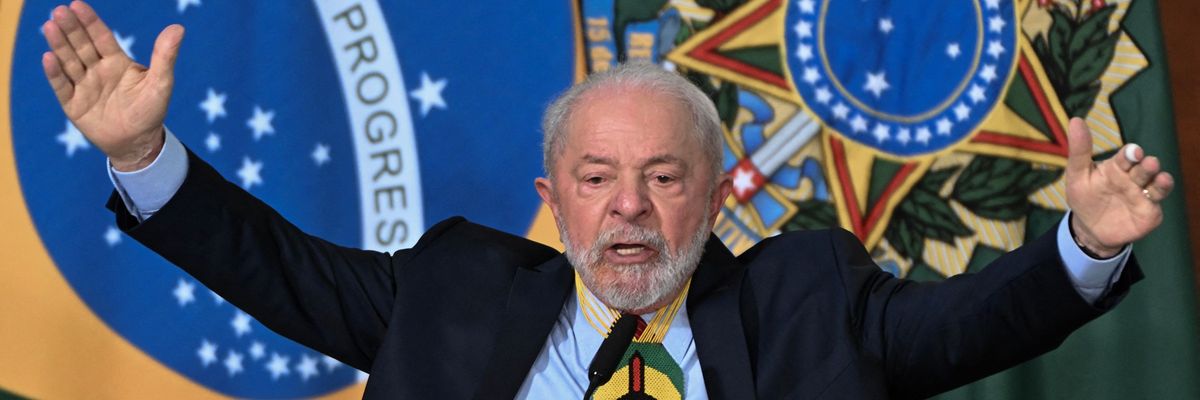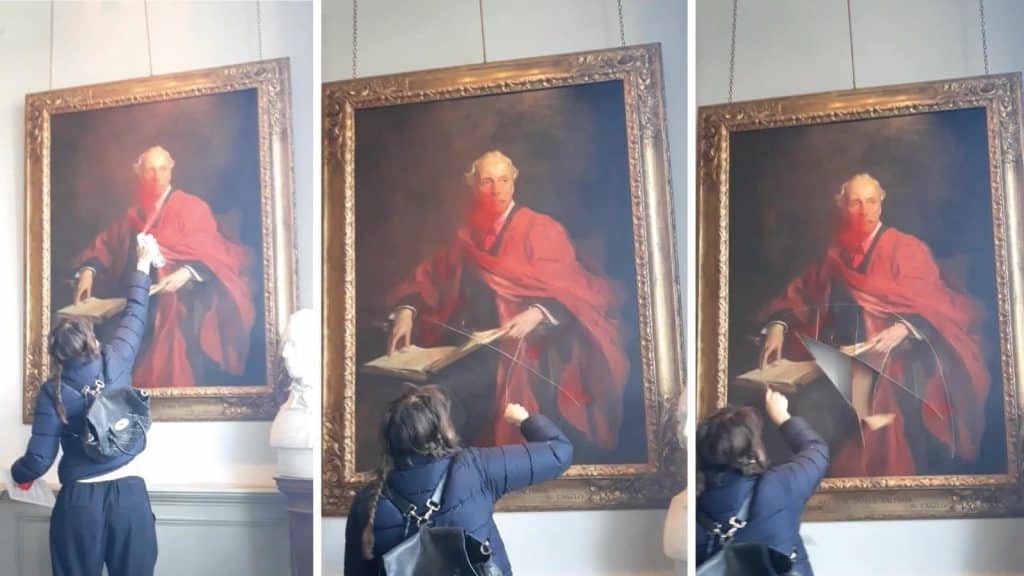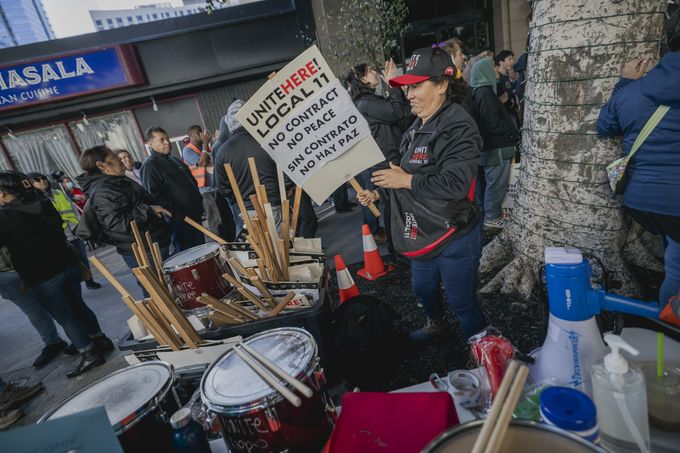"Steep declines in the Brazilian Amazon and Colombia show that progress is possible, but increasing forest loss in other areas has largely counteracted that progress," one expert said.

Brazilian President Luiz Inácio Lula da Silva delivers a speech in Brasília on June 5, 2023.
(Photo: Evaristo Sa/AFP via Getty Images)
OLIVIA ROSANE
Apr 04, 2024
COMMON DREAMS
An annual accounting of global deforestation, released Thursday, shows that political will can make a significant difference when it comes to protecting vital ecosystems and the Indigenous and local communities that depend on them—but that policymakers in many regions are not taking enough action to save tropical forests.
The data, gathered by the University of Maryland's Global Land Analysis and Discover Lab and published on the World Resources Institute's (WRI) Global Forest Watch program, found that primary tropical forest loss in 2023 decreased by more than one-third in Brazil and nearly 50% in Colombia after both countries elected leaders who championed conservation policies. However, on the global level, these declines were offset by increased deforestation in other countries.
"The world took two steps forward, two steps back when it comes to this past year's forest loss," Global Forest Watch director Mikaela Weisse said in a statement. "Steep declines in the Brazilian Amazon and Colombia show that progress is possible, but increasing forest loss in other areas has largely counteracted that progress. We must learn from the countries that are successfully slowing deforestation."
"This year's forest loss numbers tell an inspiring story of what we can achieve when leaders prioritize action, but the data also highlights many urgent areas of missed opportunity to protect our forests and our future."
All told, 3.7 million hectares of primary tropical forests were felled last year at a rate equivalent to 10 soccer fields per minute. While tropical deforestation decreased by 9% in 2023 compared with 2022, the overall deforestation rate has held steady when compared to 2019 and 2021. Tree clearing released 2.4 metric gigatons of climate pollution into the atmosphere, which is nearly half of the U.S.'s yearly emissions from burning fossil fuels.
"Forests are critical ecosystems for fighting climate change, supporting livelihoods, and protecting biodiversity," WRI President and CEO Ani Dasgupta said in a statement.
Global Forest Watch focuses on the tropics because more than 96% of human-caused deforestation occurs there. However, the climate crisis contributed to making 2023 a devastating year for global tree loss, which rose 24% due to record-breaking wildfires in Canada's boreal forests.
"That is one of the biggest anomalies on record," University of Maryland researcher Matt Hansen toldReuters, adding, "It's a big deal, and it's a cautionary tale for climate impacts to fire."
In the tropics, Brazil managed to cut primary deforestation by 36%, the lowest level in the country since 2015. The country moved from being responsible for 43% of tropical deforestation in 2022 to 30% in 2023.
The decline coincided with the election of President Luiz Inácio Lula da Silva, who replaced former right-wing President Jair Bolsonaro. Bolsonaro oversaw record deforestation as he prioritized exploitative industries over forest protections and Indigenous rights. Since taking office in early 2023, Lula has reversed course by promising to end deforestation by 2030, ramping up enforcement efforts against illegal forest clearing, rolling back anti-environmental measures, and recognizing new Indigenous territories.
"We're incredibly proud to see such stark progress being made across the country, especially in the Brazilian Amazon," Mariana Oliveira, who manages the Forests, Land Use, and Agriculture Program for WRI Brazil, said in a statement.
In Brazil, Amazon forest loss decreased by 39%, though deforestation increased in the vulnerable and vital Cerrado and Pantanal ecosystems.
"We still have a very long ways to improve and sustain the efforts, and I hope today's release energizes the national and subnational governments in Brazil—and governments around the world—to build on this momentum rather than using it as an excuse to slow down," Oliveira said.
The other 2023 success story was Colombia, which curbed primary forest loss by 49%. This reversal followed the election of left-wing President Gustavo Petro Urrego, who took office in August 2022 with Vice President Francia Márquez, a Goldman Environmental Prize winner. After a 2016 peace agreement with the Revolutionary Armed Forces of Colombia, other armed groups and other opportunists moved into territories they had vacated, increasing forest loss. Petro has prioritized conservation in negotiating peace agreements with these other armed groups.
"The story of deforestation in Colombia is complex and deeply intertwined with the country's politics, which makes 2023's historic decrease particularly powerful," WRI Colombia natural resources manager Alejandra Laina said in a statement. "There is no doubt that recent government action and the commitment of the communities has had a profound impact on Colombia's forests, and we encourage those involved in current peace talks to use this data as a springboard to accelerate further progress."
Despite the good news out of Brazil and Colombia, upticks in deforestation in Bolivia, Nicaragua, and Laos counteracted that progress on the global level. In Bolivia, forest loss rose by 27% to reach the greatest loss on record for a third consecutive year. A little over half of this was due to fires that spread more readily because of climate-fueled drought, while the rest was due to the expansion of agriculture, particularly soy. Agriculture was the main force behind deforestation in Nicaragua—which cleared 4.2% of its remaining primary forest—and Laos, which saw record loss of 47%.
Deforestation rates also continued to creep upward in Congo at 3% in 2023. This is concerning because the Congo rainforest is the last tropical forest that reliably acts as a carbon sink, and because of its importance to local communities.
"Forests are the backbone of livelihoods for Indigenous people and local communities across Africa, and this is especially true in the Congo Basin," Teodyl Nkuintchua, the Congo Basin strategy and engagement lead at WRI, said in a statement. "Dramatic policy action must be taken in the Congo Basin to enact new development pathways that support a transition away from unsustainable food and energy production practices, while improving well-being for Indigenous people and local communities as much as revenues for countries."
The new data comes as world leaders have six years to meet their promise, made at the United Nations Climate Change Conference in Glasgow in 2021, of ending deforestation by 2030. However, WRI found that nearly 2 million more hectares were cleared in 2023 than would be consistent with meeting that goal, Mongabayreported.
WRI global forest director Rod Taylor told reporters that the world was "far off track and trending in the wrong direction when it comes to reducing global deforestation."
WRI's Dasgupta said: "The world has just six years left to keep its promise to halt deforestation. This year's forest loss numbers tell an inspiring story of what we can achieve when leaders prioritize action, but the data also highlights many urgent areas of missed opportunity to protect our forests and our future."
Taylor added that the rest of the world could not rely on individual leaders like Lula or Petro, but should take steps to encourage deforestation such as making it more profitable to preserve forests than to clear them, making sure global supply chains are deforestation free, and protecting the land rights of Indigenous peoples.
"Bold global mechanisms and unique local initiatives together are both needed to achieve enduring reductions in deforestation across all tropical front countries," Taylor said.





